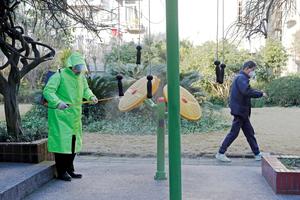Foreign residents of metropolis feel ‘pretty safe’ amid coronavirus outbreak
 Doctors at the community health service center in the Quyang neighborhood in Shanghai’s Hongkou district survey households. (YIN LIQIN / CHINA NEWS SERVICE)
Doctors at the community health service center in the Quyang neighborhood in Shanghai’s Hongkou district survey households. (YIN LIQIN / CHINA NEWS SERVICE)
Expats in Shanghai, the city with the largest number of foreigners on the Chinese mainland, said they feel “pretty safe” despite the novel coronavirus outbreak.
They are also satisfied with the information given by the government about the latest conditions, preventive measures and case numbers.
Jasur Mavlyanov, from Uzbekistan, said the community he has called home in suburban Songjiang district for two years conducts temperature checks on all residents and visitors at its gates, as do nearby supermarkets.
The 34-year-old, who manages a trading company, said he lives in a neighborhood where about one in three of the residents are from overseas. When they talk about the virus, they all agree that the Shanghai government has been very quick to respond and provides sufficient measures to prevent its further spread.
Mavlyanov, who lived for seven years in Wuhan, Hubei province — the contagion’s epicenter — and is paying extra attention to efforts to contain the virus, said he was very touched by the united and heartwarming community atmosphere in fighting it.
For example, he said one of his friends in the neighborhood bought 12,000 surgical masks to donate through various channels.
“I also know a young man from Uzbekistan who is a student at a Chinese university who flew to Guangzhou (Guangdong province) on Feb 1 to donate more than 10,000 masks to the public,” Mavlyanov said.
On Feb 1, a special column on the website of the Foreign Affairs Office of the Shanghai Municipal People’s Government began updating the city’s expat community of around 220,000 about the latest conditions, measures taken and case numbers.
In the column, information from a daily news briefing about the epidemic in the city and reminders about preventive measures are available in Chinese, English, French, Japanese and Korean.
Yin Xin, a government spokeswoman, said expats in the city can also dial 12345 to inquire about preventive measures. This service is available in seven languages from 8 am to 8 pm daily.
 Workers disinfect public areas in the Linyun neighborhood of Shanghai’s Hongkou district. (YIN LIQIN / CHINA NEWS SERVICE)
Workers disinfect public areas in the Linyun neighborhood of Shanghai’s Hongkou district. (YIN LIQIN / CHINA NEWS SERVICE)
Barbara Vaccaro, from Italy, who has lived with her family in Shanghai for seven years and plans to remain, said they are very impressed with the country’s and the Shanghai government’s efforts to care for all residents, including those from overseas.
“It looks like the local government is making a serious, well-organized effort ... Although there have been sudden changes — working from home, people wearing masks everywhere and empty restaurants — we still feel safe. It feels like a Chinese New Year break that became a bit more extreme than usual,” said Vaccaro, who runs an art studio in the city.
Dubbed “a mini-United Nations”, Changning district’s Ronghua neighborhood is home to expats from more than 50 countries and regions. More than half of the 32,000 residents are from overseas.
Sheng Hong, director of the Ronghua neighborhood community, said that when the first confirmed infection of the novel coronavirus was announced, they raced against time to issue a public notice in English on how to prevent its spread.
Foreign volunteers in the community helped with the translation, providing special care for expats under medical observation and quarantine.
A male resident was quarantined at home for 14 days after traveling to Wuhan on business. Doctors from the district’s center for disease control and prevention went to his home twice a day to take his temperature, and Sheng’s team brought him food and books.
“I don’t feel nervous and the epidemic prevention and control measures here are fairly standard. Being subject to 14 days of mandatory quarantine is the same as what we have in Japan,” the Japanese man, who declined to be named, was quoted as saying by Xinhua News Agency.
His quarantine period expired on Jan 28. “Although 14 days seemed a little bit long, he and his family cooperated very well. They fully understand that community safety is top priority at this moment,” said Sheng, adding that an Australian family of four is still under quarantine.
Some expats have joined the battle against the virus. Thomas Derksen, from Germany, who makes comedy videos in Shanghai, uploaded a clip on Jan 26 in which he talked with a medical expert from Germany to give people more information about preventing the spread of the virus. The clip, with Chinese subtitles, has been viewed millions of times on Sina Weibo.
Derksen, a former student at Fudan University in Shanghai, is fluent in Mandarin.
On Feb 1, the Foreign Affairs Office of the Shanghai Municipal Government and the Shanghai People’s Association for Friendship with Foreign Countries said they had received letters from diplomats and heads of international organizations, paying tribute to China for its determination and courage in fighting the epidemic and offering their support for the Chinese people in the battle.
“We are good friends with the lovely people of China and will stand with you in this difficult time with our hearts close together,” Ramazan Parvaz, consul general of Iran in Shanghai, wrote in a letter.
On Jan 29, the Foreign Affairs Office and the Shanghai Municipal Health Commission jointly held a meeting with 105 officials from 66 consular agencies to update them on the situation in the municipality, on the measures taken to battle the coronavirus and to supply them with information about the supply of protective items, including face masks.
After the meeting, Leisbeth Coromoto Berrios Leon, consul general of Venezuela in Shanghai, wrote in Chinese on a piece of paper, “Stay strong China.”
In addition, the Beijing citizens’ hotline 12345 is available in English, French, German, Russian, Spanish, Japanese, Korean and Arabic, with the English service available 24 hours.
Earlier, the National Immigration Administration issued a guideline for foreigners in China about preventive measures against the coronavirus.
Published in English, Russian, French, German, Japanese and Korean, the guideline advises foreigners to strengthen personal protection and health monitoring, minimize outdoor activities and maintain good hygiene and health habits.
It also answers questions about immigration policies for foreigners, as well as applications for visas and residence permits.
The administration is sending related information to foreigners via email, text message and Weibo and WeChat.
Contact the writers at zhouwenting@chinadaily.com.cn


